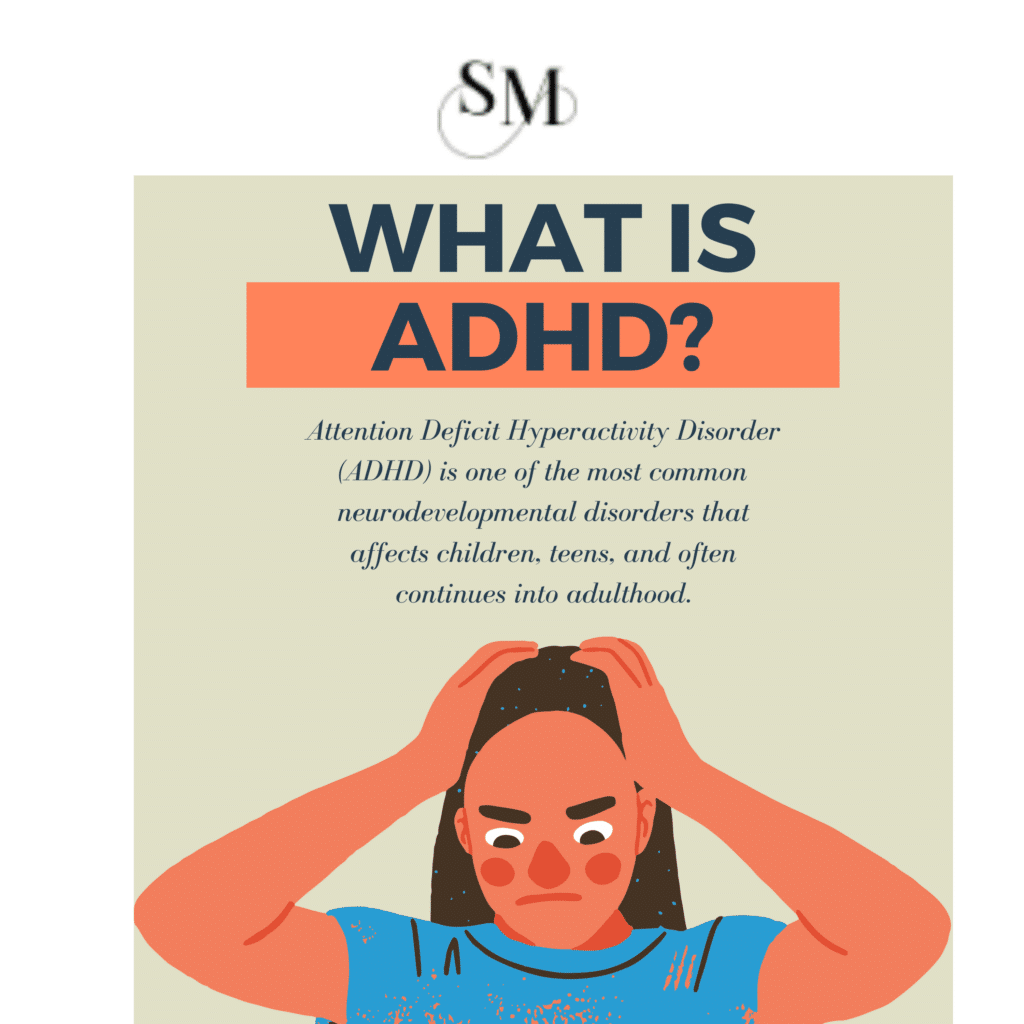Attention Deficit Hyperactivity Disorder (ADHD) is one of the most common neurodevelopmental disorders that affects children, teens, and often continues into adulthood. It impacts the brain’s ability to regulate attention, control impulses, and manage hyperactivity. ADHD can influence various aspects of life, including academics, work performance, relationships, and daily responsibilities.
In this blog, we’ll break down what ADHD is, its symptoms, causes, and treatment options.

What is ADHD?
ADHD is a condition characterized by persistent patterns of inattention, impulsivity, and/or hyperactivity that interfere with daily functioning. It’s not simply about being “restless” or “easily distracted” but rather a chronic disorder that affects how an individual processes information, manages tasks, and regulates behavior.
ADHD is typically categorized into three main types:
- Inattentive Type
- Hyperactive-Impulsive Type
- Combined Type (a mix of inattentive and hyperactive-impulsive symptoms).
Common Symptoms of ADHD
ADHD symptoms vary based on the type and can change depending on age.
1. Symptoms of Inattention:
- Difficulty focusing on tasks or activities.
- Frequent careless mistakes in school or work.
- Trouble organizing tasks, activities, or belongings.
- Easily distracted by external stimuli.
- Forgetfulness, such as missing appointments or losing items.
2. Symptoms of Hyperactivity and Impulsivity:
- Fidgeting, tapping hands or feet, or squirming in one’s seat.
- Difficulty sitting still for extended periods.
- Talking excessively or blurting out answers.
- Impatience while waiting for their turn.
- Acting without thinking, often leading to risky behaviors.
These symptoms can manifest differently in children and adults. For example, children may struggle with school assignments, while adults may find it difficult to manage time or maintain focus at work.
What Causes ADHD?
The exact cause of ADHD is not fully understood, but research suggests a combination of genetic, neurological, and environmental factors play a role:
- Genetics: ADHD often runs in families, indicating a strong hereditary component.
- Brain Structure and Function: Differences in brain activity, particularly in areas related to attention and impulse control, are observed in people with ADHD.
- Prenatal and Early Development: Exposure to toxins, alcohol, or smoking during pregnancy may increase the risk.
- Environment: Early childhood exposure to lead or extreme stress can also contribute.
How is ADHD Diagnosed?
Diagnosing ADHD involves a comprehensive assessment by a qualified professional. This typically includes:
- Detailed interviews about behavior patterns and symptoms.
- Observations of behavior at home, school, or work.
- Standardized tests to assess attention and impulse control.
It’s important to note that ADHD cannot be diagnosed based on a single test. A thorough evaluation is crucial for an accurate diagnosis.
Treatment Options for ADHD
ADHD can be effectively managed through a combination of approaches tailored to the individual’s needs:
- Behavioral Therapy: Helps individuals develop organization, time management, and social skills.
- Medication: Stimulant and non-stimulant medications are often prescribed to manage symptoms.
- Counseling: Therapy, such as Cognitive Behavioral Therapy (CBT), helps individuals address emotional challenges and improve coping strategies.
- Lifestyle Changes: Regular exercise, healthy nutrition, and consistent routines can significantly improve focus and behavior.
For children, parental training and school accommodations, such as Individualized Education Programs (IEPs), can be particularly beneficial.
Living with ADHD
ADHD is a lifelong condition, but with proper support and treatment, individuals can lead successful and fulfilling lives. Early intervention, understanding, and a structured approach can help manage symptoms effectively.
If you are looking for an ADHD assessment in Meerut, contact Surbhi Manocha, a trusted counseling psychologist specializing in ADHD diagnosis and therapy.
Taking the first step toward understanding ADHD can make a world of difference. Whether for yourself or a loved one, seeking professional help can unlock strategies to manage challenges and build a brighter future.
